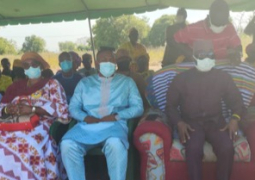The bill was tabled at the National Assembly by the vice president for the first time and was read for a second time and subsequently referred to the committee for scrutiny.
The bill aims to improve the nutritional status of the Gambian population, especially vulnerable groups such as pregnant and lactating women and children under five years. By reducing malnutrition, morbidity, and mortality rates, it aims to boost productivity and contribute to socio-economic development. It also seeks to transform the NaNA into a sustainable Centre of Excellence for nutrition policy formulation, research, and capacity building in Africa.
During the consultation, Malang N. Fofana, the deputy executive director of NaNA, explained that food and health security are critical aspects of women and children and that every woman in the country needs to have adequate access to high-quality, safe and nutritious food available and distributed to them.
“This bill is promoting access to food security for women. It also improves the skills of women compared to men, by using social and behavioral education to inform, educate and empower women to be able to take up entrepreneurship or life skills that will yield them more income and their families. So there is a lot for women in this bill,” he articulated.
Mr Fofana described anaemia as the underlying cause of maternal mortality in the country as most women die during childbirth.
“So this bill is trying to address those kinds of deficiencies. That's why in my introduction I said the Gambia is faced with a triple problem of malnutrition. We are struggling with malnutrition. It is stunting, wasting, and underweight. It's a problem for children under five.”
Mr Fofana expressed concern that although issues such as overweight obesity, hypertension, diabetes, and cancer are on the rise, there is also a pressing need to address maternal deficiency, anaemia, paramedic deficiency, early deficiency, and zinc deficiency. He added that maternal deficiencies are a significant challenge for women in the country and tackling these issues is crucial.
He said the proposed bill aims to empower efforts to address these issues.
Abdul Aziz Ceesay, the director of the National Nutrition Agency’s Social and Behavioural Change Communication (NaNA SBCC), explained that the Bill draws heavily from the Convention on the Elimination of All Forms of Discrimination Against Women (CEDAW) and the Convention on the Rights of the Child (CRC).
He stated that women bear the responsibility for food and nutrition, even at the household level. “By providing women with adequate nutrition, they will be better equipped to fulfil their reproductive, productivity, and other duties.”
Deputy Permanent Secretary Ousman Ceesay, Office of the Vice President, recalled that the proposal background of the Food Act that was in place was the one that’s giving legislation for direction to nutritional issues and food in the country.




